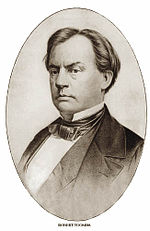Robert Toombs, Date of Birth, Place of Birth, Date of Death
TweetRobert Toombs
American politician
 Date of Birth: 02-Jul-1810
Date of Birth: 02-Jul-1810
 Place of Birth: Washington, Georgia, United States
Place of Birth: Washington, Georgia, United States
Date of Death: 15-Dec-1885
Profession: lawyer, politician
Nationality: United States
Zodiac Sign: Cancer 
About Robert Toombs
- Robert Augustus Toombs (July 2, 1810 – December 15, 1885) was an American lawyer, planter, and politician from Georgia who became one of the organizers of the Confederacy and served as its first Secretary of State.
- He served in Jefferson Davis' cabinet as well as in the Confederate States Army, but later became one of Davis' critics.
- He fled the United States after the Confederate defeat, returning in 1867 after his daughter's death.
- He regained political power in Georgia as Congressional Reconstruction ended. A lawyer by training, Toombs gained renown in the antebellum years as an orator in the U.S.
- House of Representatives, and later in the U.S.
- Senate.
- A slaveholder, he found common ground with fellow-Georgian Alexander H.
- Stephens and advocated states' rights and the extension of slavery to western territories.
- Toombs supported the Compromise of 1850, but later advocated secession.
- Toombs had emotive oratory and a strong physical presence, but his intemperate habits and volatile personality limited his career.
- In the newly formed Confederate Government, Toombs was appointed Secretary of State.
- He criticised the attack on Fort Sumter, which put him at odds with President Jefferson Davis (whose position he had coveted), and he quit the administration to join the Confederate States Army.
- He became a Brigadier-General, and was wounded at the Battle of Antietam.
- In 1863, Toombs resigned his commission in the Confederate Army to join the Georgia militia.
- He was subsequently denied higher promotion and resigned as he continued to feud with Davis.
- When the war ended, he fled to Cuba.
- He returned to Georgia in 1867, but refused to request a presidential pardon and was prohibited from holding political office until after the Reconstruction era ended.
Read more at Wikipedia
See Also
- Famous People's Birthdays on 02 July, United States
- Famous People's Birthdays in July, United States
- Famous lawyer's Birthdays on 02 July, United States
- Famous lawyer's Birthdays in July, United States
- Famous politician's Birthdays on 02 July, United States
- Famous politician's Birthdays in July, United States

